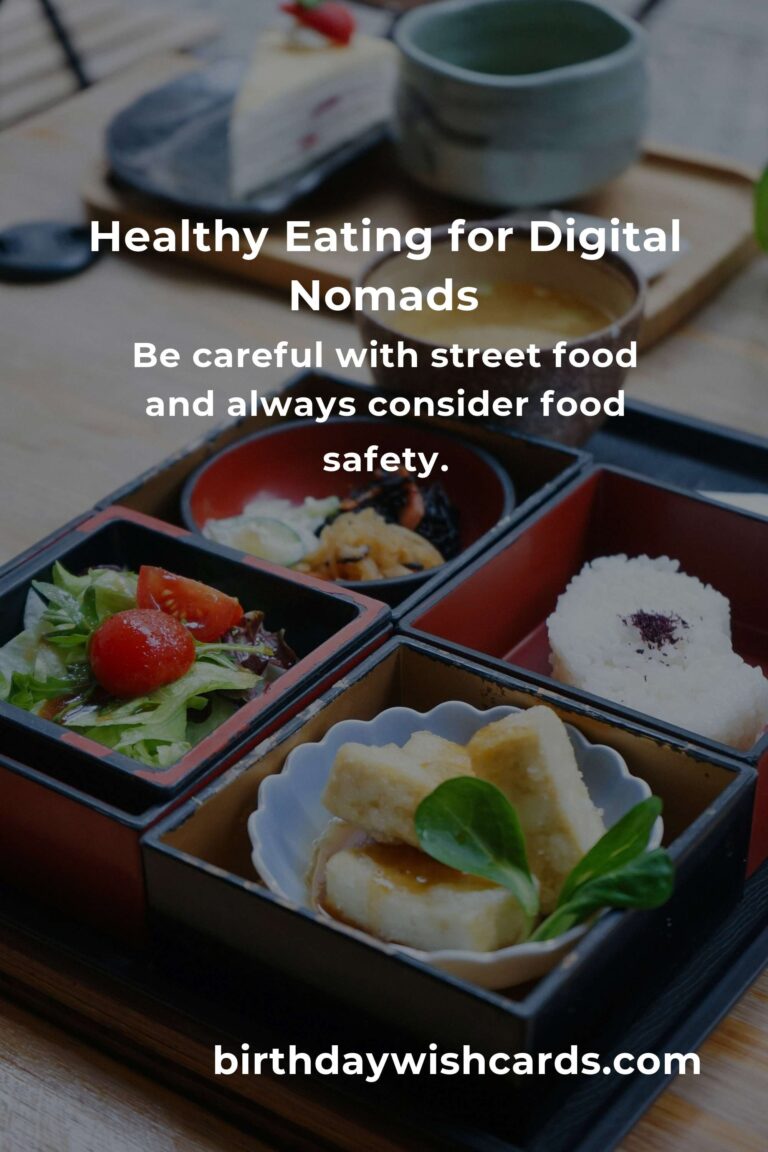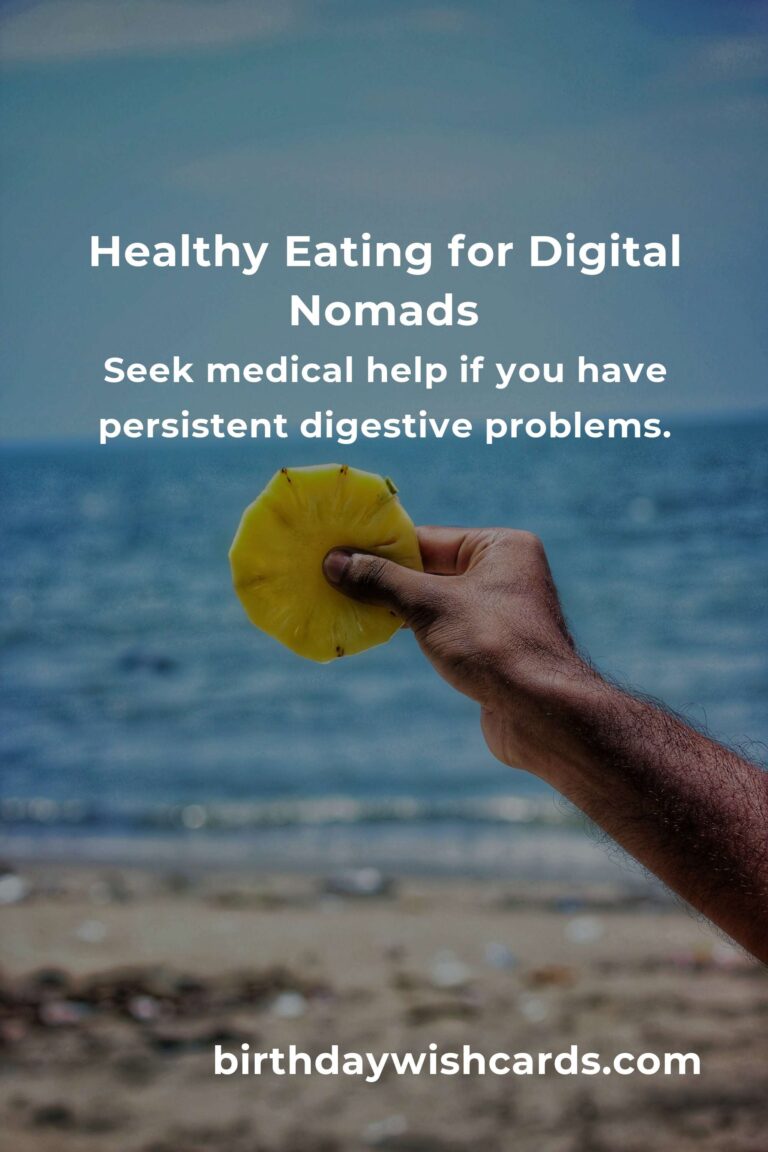
Being a digital nomad is an adventure. You’re traveling the world, working remotely, and experiencing new places every day. But let’s be honest, constantly moving and adapting to new environments can take a toll on your body—especially your digestive system. Whether you’re hopping across time zones, sampling exotic cuisines, or working long hours in unfamiliar settings, digestive issues can quickly become an unwelcome companion. But don’t worry. With a few mindful adjustments, you can support your digestive health and truly enjoy the nomadic lifestyle.
Why Digestive Health Matters for Digital Nomads
Your gut is at the core of your overall well-being. It’s not just about avoiding an upset stomach; your digestive system impacts your immune health, energy levels, mood, and even your productivity. For digital nomads, maintaining digestive health can mean the difference between a day spent exploring a new city and a day spent curled up in bed with discomfort.
Common Digestive Challenges for Digital Nomads
- Irregular eating schedules: Time zone changes and busy days can disrupt your normal mealtimes.
- Unfamiliar foods: New cuisines and ingredients can be tough for your body to digest.
- Stress: Tight deadlines, travel hiccups, and adapting to new cultures bring extra stress, which affects your gut.
- Lack of routine: Without a stable daily pattern, your digestive system can struggle to keep up.
- Food safety: Street food and local delicacies can increase your risk of foodborne illnesses.
10 Essential Tips to Improve Digestive Health on the Move
1. Prioritize Hydration
Staying hydrated is crucial, especially when you’re on the go. Dehydration can lead to constipation and sluggish digestion. Carry a reusable water bottle, and aim to drink at least 2 liters of water a day. In hot climates or after a long flight, increase your intake. If local water isn’t safe, opt for bottled or filtered water—your gut will thank you.
2. Create a Food Routine (Even When You’re Not in One Place)
Try to eat your main meals at similar times each day, no matter where you are in the world. This helps to regulate your digestive system and can ease symptoms like bloating or irregular bowel movements. Simple meal planning—even just deciding what and when you’ll eat for breakfast—can make a big difference.
3. Choose Gut-Friendly Foods
Seek out fiber-rich foods like fruits, vegetables, whole grains, and legumes. These help keep things moving and feed the beneficial bacteria in your gut. Incorporate probiotic-rich foods like yogurt, kefir, sauerkraut, or kimchi to support healthy digestion. When trying new foods, go slow—introduce one new dish at a time to see how your body reacts.
4. Listen to Your Body
Traveling is exciting, but it’s important to tune in to your body’s cues. If something doesn’t feel right, give yourself grace to rest and recover. Don’t force yourself to eat foods that upset your stomach just for the sake of experience. Your health comes first.
5. Don’t Skip Meals (But Don’t Overeat Either)
Skipping meals can slow your metabolism and disrupt your digestion. But overeating, especially unfamiliar foods, can also lead to discomfort. Aim for balanced, moderate meals throughout the day. Pack healthy snacks like nuts, seeds, or fruit for when you’re on the move.
6. Move Your Body Every Day
Physical activity stimulates digestive processes and reduces stress. Whether it’s a morning walk, a short yoga session, or stretching between work calls, movement helps keep your gut happy and healthy. Even a 10-minute stroll after a meal can make a difference.
7. Manage Stress Mindfully
Stress and digestion are tightly linked. Traveling, meeting new people, and juggling work can be exciting but also overwhelming. Practice mindfulness, deep breathing, or meditation to calm your nervous system and support your gut. Even finding a quiet moment to breathe deeply can help.
8. Practice Food Safety
Food poisoning is a common hazard for nomads. Stick to reputable vendors, eat freshly cooked meals, and avoid raw or undercooked meats. Wash fruits and vegetables with safe water. When in doubt, peel it, boil it, or forget it!
9. Get Enough Sleep
Jet lag and late-night work sessions can throw off your sleep schedule, which impacts digestion. Aim for 7-8 hours of restful sleep per night. Establish a calming bedtime routine to help your body wind down, even if your surroundings are unfamiliar.
10. Carry Digestive Aids (Just in Case)
Sometimes, despite your best efforts, digestive issues happen. Pack a small kit with essentials: probiotics, ginger tea, peppermint oil capsules, or antacids. These can provide quick relief and peace of mind when facing unexpected discomfort.
How to Adjust to New Cuisines and Cultures
Part of the joy of being a digital nomad is sampling local flavors. But your gut might not always be ready for spicy street food or rich desserts. Start by trying small portions, observe how your body responds, and gradually increase variety. Don’t be afraid to ask locals for recommendations that are gentle on the stomach—they often know best!
Building a Gut-Healthy Workspace
Your environment impacts your eating habits and digestion. Find a comfortable, clean spot for meals. Take time away from your laptop or phone while eating to help your body focus on digestion. If possible, prepare simple meals in your accommodation to control ingredients and portion sizes.
Social Life and Digestive Health
Socializing is a big part of the nomad lifestyle, from coworking meetups to group dinners. Don’t feel pressured to eat or drink more than you’re comfortable with. It’s okay to explain your dietary needs or skip a round if you’re not feeling your best. True friends will understand and support your choices.
Long-Term Gut Health: Building Resilience on the Road
Gut health is a long game. The more you treat your digestive system kindly, the more resilient it becomes. Over time, you’ll learn which foods and habits work best for you. Keep a simple journal to track what you eat and how you feel—patterns will emerge and help guide your choices.
When to Seek Medical Help
If you experience persistent digestive issues like severe pain, prolonged diarrhea, vomiting, blood in your stool, or unexplained weight loss, seek medical help immediately. Many cities have clinics that cater to travelers. Don’t ignore serious symptoms—your health is worth the time and investment.
Stories from the Road: Real Nomads, Real Tips
- Anna from Berlin: “I always carry a mini spice kit. A pinch of ginger or turmeric can calm my stomach and add flavor to bland meals.”
- Marco from Brazil: “I learned to say ‘no onions, please’ in five languages. Knowing your triggers and communicating helps a lot.”
- Sophia from Australia: “Finding a local market with fresh produce is always my first step in a new city. It’s a great way to eat healthy and explore.”
Conclusion: Embrace the Journey, Nourish Your Gut
Being a digital nomad is about freedom, adventure, and growth. By taking small, mindful steps to care for your digestive health, you’ll feel better and get more out of every experience. Remember, your gut is your travel companion—treat it well, and it’ll help you thrive wherever the road takes you.
FAQ: Digestive Health for Digital Nomads
- Which foods are best avoided in high-risk countries? Stick to cooked foods, avoid tap water, and be cautious with salads or raw produce unless you can wash them yourself.
- Can probiotics help with travel-related digestive issues? Yes! Probiotic supplements or foods can help maintain healthy gut flora during travel.
- How do I stay regular on long flights? Drink plenty of water, walk around when you can, and eat fiber-rich snacks.
- Is it okay to fast when traveling? Listen to your body. Some people find intermittent fasting helpful, but it’s not for everyone. Don’t force it if it doesn’t feel right.
Stay hydrated to keep your digestion smooth.
Eat regular meals, even when your schedule changes.
Introduce new foods gradually to avoid stomach upset.
Listen to your body and rest when needed.
Pack healthy snacks for long travel days.
Move daily to support your gut and reduce stress.
Practice mindfulness to manage travel-related anxiety.
Be careful with street food and always consider food safety.
Track what you eat to identify your triggers.
Seek medical help if you have persistent digestive problems.
#DigitalNomad #DigestiveHealth #GutHealth #NomadLife #TravelWell #HealthyTravel #RemoteWork #WellnessOnTheRoad #FeelYourBest #AdventureAwaits













